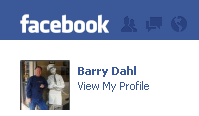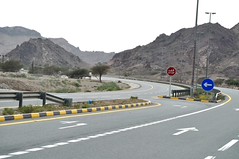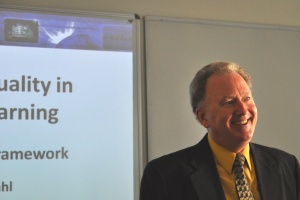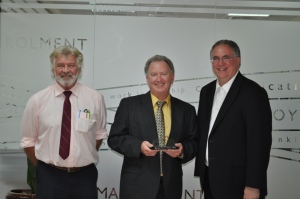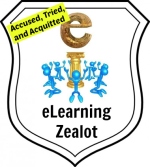 I finished reading Amusing Ourselves to Death by Neil Postman on the same day that the iPads hit the stores in early April. I didn’t plan it that way; it just happened. As I’ve been pondering about the terrific book and also pondering about the hype surrounding the iPad, I keep bringing those two worlds together in some sort of weird mashup in my mind. (CC Flickr photo by cogdogblog)
I finished reading Amusing Ourselves to Death by Neil Postman on the same day that the iPads hit the stores in early April. I didn’t plan it that way; it just happened. As I’ve been pondering about the terrific book and also pondering about the hype surrounding the iPad, I keep bringing those two worlds together in some sort of weird mashup in my mind. (CC Flickr photo by cogdogblog)
 Postman’s book was published in 1985 and is a treatise on how the world was being shaped (poorly) by the way that television had taken over the entertainment scene as well as the more serious forms of discourse such as news, politics, presidential debates, etc. He thought that Aldous Huxley got it right in the book Brave New World, where the people were oppressed by their addiction to all forms of amusement, rather than by George Orwell’s depiction of society in the book 1984, where they were oppressed by the government.
Postman’s book was published in 1985 and is a treatise on how the world was being shaped (poorly) by the way that television had taken over the entertainment scene as well as the more serious forms of discourse such as news, politics, presidential debates, etc. He thought that Aldous Huxley got it right in the book Brave New World, where the people were oppressed by their addiction to all forms of amusement, rather than by George Orwell’s depiction of society in the book 1984, where they were oppressed by the government.
Here’s a terrific cartoon by Stuart McMillen that helps illustrate the push/pull going on throughout Postman’s book between the Orwellian view (1984) and the Huxleyan view (Brave New World). To steal a few lines from the cartoon (which are stolen from the book):
- What Orwell feared were those who would ban books.
- What Huxley feared was that there would be no reason to ban a book, for there would be no one who would want to read one.
- Orwell feared the truth would be concealed from us.
- Huxley feared the truth would be drowned in a sea of irrelevance.
Postman feared that Huxley was right and that it was an even worse outcome than Orwell’s version. Postman also spoke about the importance of education to get us through this changing landscape where television was turning us into passive consumers of televised content (actually it’s all about the form/style, not about the content). Postman (from Wikipedia – a decent article, really!) “also argues that television is not an effective way of providing education, as it provides only top-down information transfer, rather than the interaction that he believes is necessary to maximize learning. He refers to the relationship between information and human response as the Information-action ratio.”
Postman’s concerns about television (and computers which were just starting to proliferate in 1985) are not centered on the lousy, stupid stuff that was on TV during the time period that the book was written. It’s not the junk TV that dumbs down the culture, it’s the more serious stuff (news, politics, education, religion, etc.) that’s being packaged as entertainment rather than serious discourse. At least the low-level junk TV doesn’t pretend to be something more than it is.
He specifically mentions computers and education sporadically throughout the book. One particularly salient passage is reproduced below (pg. 161):
“For no medium is excessively dangerous if its users understand what its dangers are. It is not important that those who ask the questions arrive at my answers or Marshall McLuhan’s (quite different answers, by the way). This is an instance in which the asking of questions is sufficient. To ask is to break the spell. To which I might add that questions about the psychic, political and social effects of information are as applicable to the computer as to television. Although I believe the computer to be a vastly overrated technology, I mention it here because clearly, Americans have accorded it their customary mindless inattention; which means they will use it as they are told, without a whimper. Thus, a central thesis of computer technology – that the principle difficulty we have in solving problems stems from insufficient data – will go unexamined. Until, years from now, when it will be noticed that the massive collection and speed-of-light retrieval of data have been of great value to large-scale organizations but have solved very little of importance to most people and have created at least as many problems for them as they may have solved.”
I don’t know about you, but that sounds to me like he had a pretty accurate view (from the mid-1980s) about the future of the computing world and the massive collection of data (hint, rhymes with Doogle).
So, what would Postman think of the iPad? I don’t even begin to pretend that I would know what Postman might think about anything; this is just a first attempt at putting together some of his ideas. So here it goes.
- I think that Postman would have lamented the entire movement toward edutainment over time. Making learning less serious and more fun would not be viewed positively and the results attained would be questioned fervently. (of course I could be wrong)
- I think that Postman would have found the use of the Internet as not particularly compelling as an aid to education – especially the “Web 1.0” version of websites and services, since it was (1) very similar to the television as a one-way form of communication, (2) a great mixture of serious and trivial content (think of a page of serious and informative text on a page with a flashing ad of “Lose Belly Fat Now!” on the page), and (3) that a great amount of web content was clearly designed to be amusing and not serious (not that he was against amusement all the time, just not mixed in with the serious matters of life). (of course I could be wrong)
- I think that Postman might have thought that the Read/Write web (Web 2.0) was a major step forward in providing easy opportunities for people to interact, collaborate, and learn in a more robust manner. (of course I could be wrong)
- I also think that Postman would have generally been positive about the whole era of user-generated content. Creating and publishing videos, podcasts, blog posts (etc, etc,) might have been favorably viewed as breaking away from the one-way communication of the boob tube and making minds active and engaged in learning and sharing. (of course I could be wrong)
My sense is that in a Postman-point-of-view you would see the iPad as a major step backward, at least in the short-run with version 1. Much of the content creation possibilities are not possible on the iPad; it feels much more like a “media consumption tool” than a creation tool. Truth be told – it’s just a big iPod Touch and that feels to me much more like a device for amusement than a device for serious learning and other purposes. I know that people are developing interesting educational uses for the Touch, but seriously, are those things better on the Touch than on a different device? I doubt it.
My sense is that the iPad is one more (big) straw on the back of the amusement camel.
Or, to put it another way, the iPad reduces the information-action ratio.
Of course I could be wrong.
If you’ve read all the way to the bottom, you might enjoy this photo. Let the hazing begin.
Filed under: Higher Ed, Uncategorized | 3 Comments »




